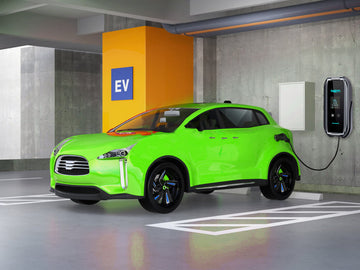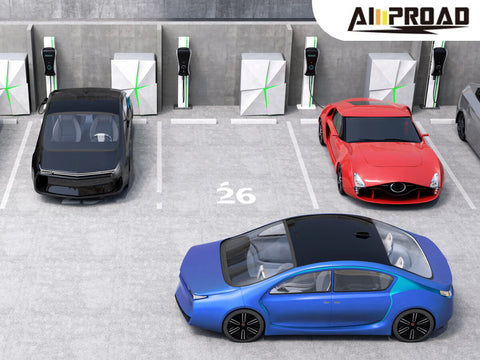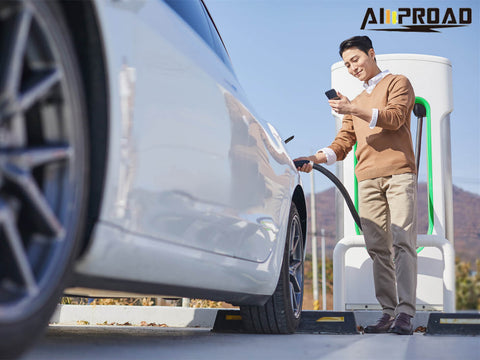
As the electric vehicle market expands, the cost of using EV charging stations varies based on several factors. Charging fees depend on location, network pricing models, electricity rates, and available incentives. While some stations offer free charging, this is not a universal standard. Different regions and providers implement various pricing structures, reflecting the evolving nature of EV infrastructure and consumer demand. Understanding these factors helps clarify when and where charging may come at no cost.
Public Charging Stations
Public EV charging stations are a key component of the charging infrastructure, catering to users who need to charge their vehicles while away from home. Traditionally, many public charging stations operated on a pay-per-use model, requiring users to pay for the electricity consumed during the charging session. However, in recent years, there has been a shift in this paradigm with the introduction of various pricing models.
Pay-Per-Use: Some charging stations still operate on a pay-per-use basis, where users are charged a fee based on the amount of electricity they consume. This model is common at EV charging stations operated by private companies, utilities, or independent charging networks.

Membership Programs: Charging networks often offer membership programs where users pay a monthly or annual fee to access the network's charging stations. In return, members may receive discounted charging rates or other benefits. These programs are designed to incentivize loyalty and repeat business.
Subscription Services: Some charging networks have introduced subscription-based services that provide users with unlimited access to electric vehicle charging station for a fixed monthly fee. This model aims to offer simplicity and cost predictability for frequent users.
Charging at Home
Amproad emerges as a game-changer, offering top-quality and affordable Level 1 and Level 2 EV home charger. Amproad's commitment to delivering cutting-edge technology at a price point that resonates with budget-conscious consumers positions it as a beacon in the world of EV charging.
Amproad's Level wide voltage ev chargers are an ideal choice for those seeking a straightforward and cost-effective solution. Designed for standard electrical outlets, these chargers offer a practical and accessible way to charge your EV at home without breaking the bank.
For those desiring a faster and more efficient charging experience, Amproad's Level 2 home EV charger and portable EV charger takes center stage. Bringing together speed and affordability, these chargers cater to users who prioritize both convenience and cost-effectiveness in their home charging setup.
Why Choose Amproad?
Quality Assurance: Amproad is synonymous with top-notch quality, ensuring that each charging solution meets rigorous standards for reliability, safety, and performance.
Affordability: In the dynamic landscape of EV charging solutions, Amproad stands out for its commitment to affordability. The company understands the importance of making quality charging accessible to a broad audience.
Cutting-Edge Technology: Amproad's chargers incorporate the latest in charging technology, enhancing the overall efficiency of the home charging process.
As EV ownership becomes more prevalent, the fusion of convenience and cost-effectiveness in home charging becomes paramount. Amproad, with its commitment to quality and affordability, emerges as a key player in elevating the home charging experience. By integrating Amproad's cutting-edge Level 1 and Level 2 EV charger into your home charging setup, you not only optimize the efficiency of charging your EV but also make a conscious choice towards a sustainable and accessible electric future. Home EV charger is not just a necessity; it's an opportunity to redefine the way we power our vehicles, and Amproad is at the forefront of this transformative journey.

Factors Influencing Charging Costs
Several factors influence the cost of charging an electric vehicle, whether at public EV car charging station or at home:
Electricity Rates: The cost of electricity varies widely depending on geographic location and local utility rates. Regions with lower electricity rates generally result in lower charging costs for EV owners.
Charging Speed: The charging speed, measured in kilowatts (kW), affects how quickly a vehicle can recharge. Faster charging speeds may come with higher costs, reflecting the infrastructure required to deliver electricity at a rapid rate.
Charging Network Policies: Charging networks and vehicle charging stations operator set their pricing policies, which can include pay-per-use rates, membership fees, or subscription plans. Understanding these policies is essential for users to make informed decisions about where and how to charge their vehicles.
Vehicle Efficiency: The energy efficiency of the electric vehicle itself plays a role in charging costs. More efficient vehicles require less energy to cover the same distance, reducing the overall cost per mile.
Government Incentives: In some regions, governments may offer incentives, rebates, or subsidies to encourage EV adoption. These incentives can offset the initial cost of EV ownership and contribute to reducing the overall cost of charging.
The Future of EV Charging Costs
As the electric vehicle market continues to expand, the landscape of charging costs is likely to evolve. Several trends and developments may shape the future of EV charging:
Increased Competition: Growing competition among charging networks and providers may lead to more competitive pricing structures, potentially resulting in lower charging costs for consumers.
Advancements in Technology: Ongoing advancements in charging technology, such as higher charging speeds and increased efficiency, may impact the cost-effectiveness of charging solutions.

Government Policies: Government policies and initiatives aimed at supporting sustainable transportation may influence charging costs. Continued support for EV adoption through incentives and infrastructure development can contribute to a more affordable charging ecosystem.
Integration with Renewable Energy: The integration of renewable energy sources into the charging infrastructure can impact the environmental and economic sustainability of EV charging. EVSE charging station powered by renewable energy may offer cost advantages over traditional grid-powered stations.
As the industry continues to evolve, it's crucial for EV owners to stay informed about the charging options available to them and to consider both the immediate and long-term costs associated with charging their vehicles. Whether paying per session, through a membership, or enjoying the occasional free charge, electric vehicle owners navigate a diverse charging landscape that reflects the ongoing transformation of our transportation infrastructure.
Aren't There Free Charging Stations?
In certain cases, charging stations may still offer free charging as a promotional or strategic initiative. This approach is often adopted by businesses, municipalities, or charging networks to attract users and promote the adoption of electric vehicles.
It's important to understand that electric vehicles (EVs) utilize two different charging levels. Level 2 charging employs AC electricity, similar to what you find in standard wall outlets, and is designed for overnight charging. On the other hand, Level 3 charging relies on DC electricity, comparable to what a battery provides, allowing for rapid charging within a few minutes.
Free EV level 2 charger are commonly available at various businesses aiming to attract customers, including hotels, theaters, theme parks, and restaurants. Electric cooperatives also frequently offer complimentary Level 2 EV home charging at their customer service locations. These chargers are cost-effective to install, often fitting comfortably within companies' advertising budgets. For instance, during visits to Houston, my family enjoys the convenience of a nearby hotel with four complimentary Tesla chargers.
Tesla occasionally provides free Level 3 charging at their Superchargers as part of promotional incentives. This may include awarding free Supercharger miles upon purchasing a vehicle during specific incentive periods or earning miles for recommending a Tesla vehicle to a friend. A notable benefit comes with purchasing a gently used older Model S or Model X that includes complimentary Supercharging for life.
How much does it cost to charge a Tesla at a charging station?
Supercharger pricing is location-dependent, but a common rate is around $0.25 per kilowatt-hour (kWh). For a full recharge providing approximately 250 miles of range, users can expect to spend approximately $22.00. This cost structure reflects the efficiency and speed of Tesla's Superchargers, offering a quick and convenient solution for electric vehicle owners. While rates may vary slightly based on regional electricity costs and other factors, the transparent pricing model aligns with Tesla's commitment to providing a reliable and accessible charging infrastructure to charge Tesla 110v etc.. As electric vehicles become more prevalent, understanding the cost dynamics of Supercharger usage contributes to informed decision-making for Tesla owners seeking efficient and cost-effective charging solutions.
Who Pays for Free EV Charging Stations?
Free EV charging stations are often sponsored by businesses, local governments, or charging networks seeking to attract and retain customers. In some cases, businesses offer free charging as an incentive for patronage, fostering goodwill and promoting a positive environmental image. Local governments may install free charging stations as part of sustainability initiatives to encourage electric vehicle adoption. Charging networks sometimes deploy free stations as a promotional strategy to build brand loyalty and attract users to their paid services. While these stations are a boon for EV owners, the costs are typically borne by the entities providing the charging infrastructure, reflecting a collaborative effort to support the growth of the electric vehicle ecosystem.


